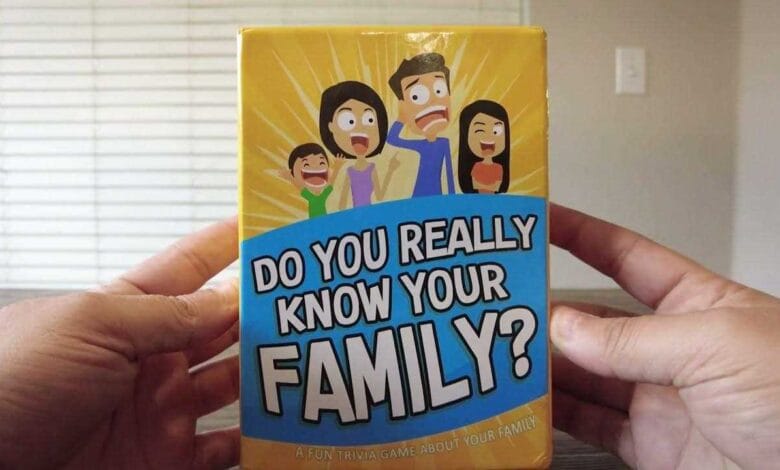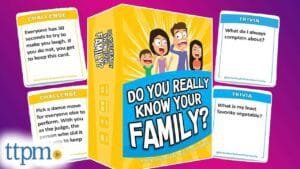Real Talk: Do You Really Know Your Family Game Reviews That Matter

Not every game is made equal when it comes to family game night. While some end up in the back of the closet after one awkward round, others leave everyone laughing and bonding for hours. Because of this, “Do You Really Know Your Family?” has aroused interest in homes everywhere. Does it genuinely strengthen family bonds or is it just another party game?
You’re in the right place if you’ve been perusing bookshelves or the internet wondering if this game is authentic or just another overhyped deck of cards. This pitch isn’t sugarcoated. This is genuine conversation.
What Is “Do You Really Know Your Family?” Game Really About?

Let’s establish the scene. There are no intricate rules or trivia in this game. Rather, it is replete with challenges and questions that encourage players to share, guess, and occasionally chuckle at one another’s surprising responses. You’ll discover who is the practical joker, who secretly despises pineapple on pizza, and perhaps—just possibly—who has been concealing their desire to work as a dog groomer.
Here is a quick rundown of what’s in the package:
| Item | Description |
| Question Cards | 200+ unique prompts about family members |
| Challenge Cards | Fun tasks like mimicking someone or acting silly |
| Instruction Booklet | Simple, straightforward guidelines |
| Number of Players | 3 or more |
| Age Range | Recommended for ages 8+ |
| Estimated Game Time | 30–60 minutes |
The questions are appropriate for all age groups, from teenagers to grandparents. You don’t have to be a genius to share a little bit about yourself, and you could even politely roast your siblings.
Why Families Are Talking About This Game
Let’s face it, there aren’t many games that emphasize curiosity and emotional connection. “Do You Really Know Your Family?” is unique in that it encourages candor, humor, and occasionally even a hint of genuine emotion.
Consider this: how recently have you inquired about your brother’s greatest fear? Or your mother about her ideal job as a child? Most likely not. However, this game places those discussions in the middle of the table.
More significantly, it makes people talk. Nobody is engrossed in their phones. Nobody is dozing off. Because players feel heard and seen, it’s one of the few games where players’ attention spans truly extend.
Real Talk: The Pros and Cons of This Game

Let’s get straight to the point.
Advantages:
- No intricate regulations In just a few minutes, begin playing.
- Encourages in-depth discussions transcends casual conversation
- All ages can use it. Excellent for families with multiple generations
- Replayable Every time, new responses
Cons:
- If played too frequently for brief periods of time, it may become monotonous.
- Not recommended for very young children (some questions may be too complex for them to understand).
- For shy or private people, some prompts might feel too intimate.
Does it matter, then? Indeed. Because it really does matter how you spend time with your family, especially in this age of technology distraction. Additionally, games like these encourage you to put down your screens and engage with others in person.
What Real Players Are Saying
Don’t rely solely on our word. We examined real user reviews from well-known platforms. What players had to say was as follows:
- We laughed so hard that I started crying. learned things I didn’t know about my father!
- “While 90% of the questions got us talking and laughing, not all of them were successful.”
- “After supper, it’s our new favorite family game.”
- We simply ignored some questions that were too in-depth. Still worthwhile.
- Ideal for adults and teenagers. We even played it with the grandparents over Thanksgiving.
This game’s character comes from that variety of responses. It isn’t meant to be flawless. Feedback indicates that it does exactly what it is supposed to do, which is to spark connection.
When’s the Best Time to Play This Game?

It can be played at holiday get-togethers, weekend get-togethers, and family dinners. It’s meaningful enough for a family reunion but informal enough for a Friday night. Don’t force it, though. When everyone is in the mood to relax and talk, the game runs more smoothly.
Tips for Getting the Best Experience
- Create the atmosphere Snacks, a calm atmosphere, and soft background music are helpful.
- Don’t hurry. After each response, let the conversation flow naturally.
- If a question seems too awkward, feel free to skip it.
- Encourage openness without putting undue pressure on others.
- Make it a custom. Review it once a month to observe how the responses have changed.
You’ll be shocked at how people react over time.
Final Verdict: Should You Try It?
“Do You Really Know Your Family?” is worth keeping on the shelf if you’re searching for something lighthearted but profound—something that connects generations. It’s not flawless. Not a game. However, this straightforward card game provides a welcome diversion in a society where people are frequently more glued to their screens than to one another.
One evening. Just one table. A couple of cards. Additionally, you may discover that you don’t know your family as well as you initially believed. Hey, that’s where the fun starts.
Q&A: Frequently Asked Questions
Q1. Can children under the age of eight play this game?
Although the game is suitable for families, some of the questions might be too sophisticated or abstract for very young children. Ages 8 and up are ideal.
Q2. How long does a game typically last?
Depending on how in-depth the discussions get or how many cards you decide to use, most rounds last anywhere from thirty to sixty minutes.
Q3. Is it possible to play this game online or through Zoom?
Definitely. Simply assign one person to read the cards while the others answer. It performs surprisingly well in virtual environments.
Q4. What occurs if a person declines to respond to a question?
No pressure! It is simple for players to pass their turn or skip a card. The goal of the game is to have fun, not to make you uncomfortable.
Q5. Is it replayable?
Very. Replaying it months apart frequently sparks new discussions because people change and their answers do as well.
Q6. Is it possible to include your own unique questions?
A lot of families do write their own on slips of paper or blank cards and mix them in with the deck.
Q7: Is this game a suitable present?
Certainly. It’s enjoyable, personal, and suitable for all ages. It’s a good choice for housewarmings, holidays, and birthdays.



